The Four Skills Are Listening, Speaking, Reading And Writing. Don’t Be Discouraged By Slow Progress!

The four skills are listening, speaking, reading and writing. Don’t be discouraged by slow progress!
Listening
Practice listening! Infants “listen” for more than a year before they can say anything close to “mom” or “dad”.
Watch videos and listen to music in your language.
Try to recognize words, even sounds.
Don’t bother trying to understand, just get used to the sound of the language.
When others in class speak, listen for what they say and mentally build images of their answers—in the language itself.
Speaking
Read aloud: think of it as training your mouth to make the new sounds.
Learn a short standard sentence, then substitute vocabulary/
Subject and verbs can change (I am going; you are going; etc.)
Objects can change (I buy a car; I buy a CD; etc.)
In class, if your “answer” does not come to mind, repeat the question in the language.
Stay in the mind set of the language, giving your brain time to work in the new language.
Reading
Do not read word-by-word, or translate word-by-word.
Prepare yourself for a reading:
study its vocabulary first;
review the advance questions.
Then put aside everything and just read, even twice.
Do not look up vocabulary while reading.
Do not write in your text book - separately develop a vocabulary list
Go beyond your textbook!
Children’s books are illustrated and easy to read!
Websites are rich opportunities to explore your hobbies in other languages,
Read/sing song lyrics of the language!
As you advance, read novels- but read for the story, not vocabulary.
Writing
Some languages have unfamiliar alphabets, so practice!
Write out sentences you have practiced orally.
Carefully construct patterns and then write out the sentences with substitute words–multiple times.
If you have spell check and the “autocorrect” grammar feature in your word processing, use it!
When you get corrections, re-write them.
Correct what you got wrong, even repeating in order to embed it in your mind.
More Posts from Underhill2 and Others
Hey I have good news for everyone.
Cringe culture literally does not exist outside of the internet.
I take my Minecraft backpack to college and I get tons of compliments on it. My boss’s son plays Minecraft and he’s elated to have a “resident Minecraft expert.”
Lots of things that fall under “cringe” are very dear to me and my friends. Good people recognize and celebrate that passion, no matter what it’s for.
I mean, yes, a lot of horror media boils down to “wouldn’t it be fucked up?”, but let’s not be reductive – there are several distinct subgenres of “wouldn’t it be fucked up?”, including but not limited to:
Proposing a very improbable situation, then gesturing toward it and asking “man, wouldn’t this be fucked up?”
Wildly exaggerating an everyday state of affairs in order to demonstrate that it was, in fact, always fucked up.
Taking a thing that it’s broadly agreed is fucked up and making it a different kind of fucked up.
Inventing a new type of guy, then pointing at the guy and going “this guy is fucked up.”
Grabbing the audience by the shoulders like, no, man, the fucked up thing is, like, a metaphor. For a different thing. That is also fucked up.
Taking a genuinely innocuous situation and through some unlikely contrivance rendering it fucked up.
Making a thing that self-referentially gestures at itself and asks “isn’t it fucked up that this is so fucked up?”
Framing a fantastical scenario and asking “is this fucked up? why is it fucked up? what does it mean to be fucked up? what is ‘fucked’? what is ‘up’?”
This may be a vague question but, how can i give my life structure after school ends? I work best when im forced to follow a routine, deadlines etc and being “free” makes me lazier and unsatisfied because of that. I want to keep learning, reading, working out and generally improving myself but i dont know how to stay motivated and set my own goals
What Do I Do With My Life When School Ends?!?!?
1. Make a Routine. As you said, routines motivate you and help you to achieve goals and feel productive. Just because school has ended doesn’t mean your routine has to stop. Keep waking up at the same time in the morning and chunk your activities throughout your day as you would if you were still in school.
2. Find Your Hobbies. If you have hobbies already or are wanting to try out something new, schedule time in your day to do so. If you like to read, set aside an hour in your routine to read. If you want to learn how to knot, set aside a time in your routine to watch some knitting techniques on YouTube.
3. Work Out. Add working out at the gym or at home to your routine. I like going to the gym for an hour and a half or so. Add it to your routine.
4. Learn Self Defense. It’s never too late to learn some good ole self defense techniques, no matter who you are. See if your local gym offers some classes.
5. Get a Job or Internship. If you don’t have a summer job, look around your area for places that’ll be hiring in the summer. Fast food, retail, movie theatres, bowling alleys, skating rinks, libraries, etc. See if local colleges are offering internships and apply for any that might interest you or are related to your degree if you’re in college.
6. Volunteer. Volunteering makes you feel good and it’s good for your community. See if local animal shelters or nursing homes are taking volunteers.
7. Take Summer Classes. See if you’d be interested in taking summer classes and your local community college or even online. Learn something that you’re interested in or something that will look good on a resume. Learning to code, learning a second language, and learning how to use all of the MS Office Suite applications are all good options.
7. Take Day Trips. Take a day or a half a day to go somewhere that you’ve never been. It doesn’t have to be in another country or even another state. It can be a local restaurant you’ve never been to or a town you’ve only ever driven through. Drive until something catches your eye.
8. Hang Out With Friends. Obviously, the summer is about spending time with people you care about. Remember to spend time with your friends and family. And remember to keep everything within your routine so you’ll feel as productive as possible!
Good luck xx
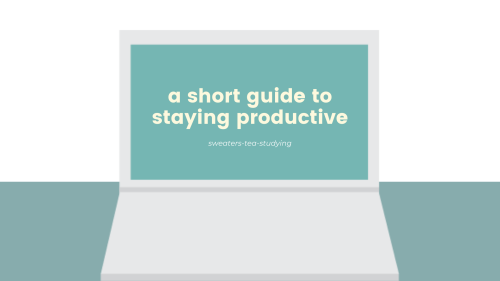
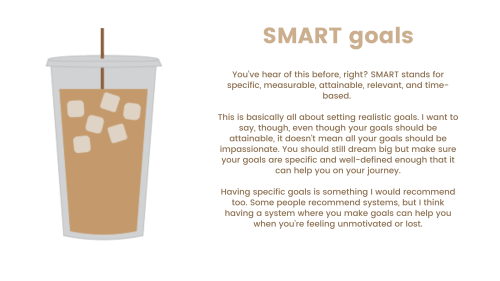
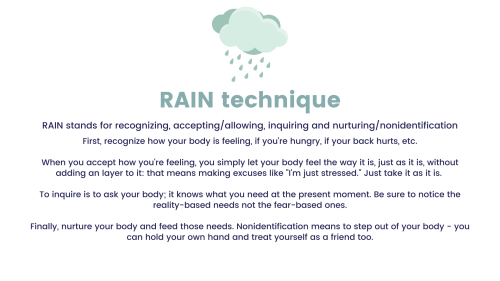
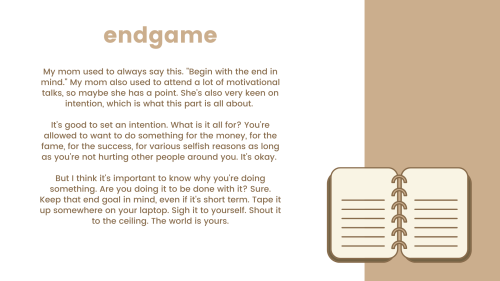
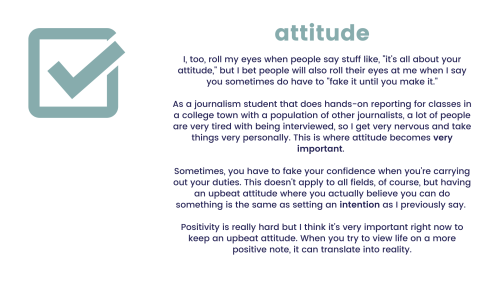
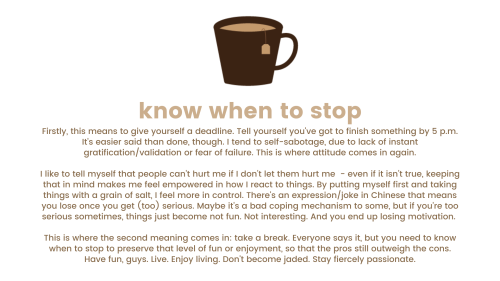
042420
As most people are working and studying from home right now, I wanted to share some concrete, implementable ways you can help yourself feel better. Though I believe productivity and quantity of work done (or lack thereof) doesn’t/shouldn’t translate into your self-worth and how you view yourself, when you get work done, you actually do feel better in your own body.
By the way, it’s the first time I’m formatting a tips/guide post like this, so I apologize that I couldn’t be more concise.
I’ve spoken to a licensed professional counsellor as well as to some professionals who have been working from home for a long time, and some of the advice above is from them. I’m also sharing from my own experience as someone who used to be very productive and an (ex-)overachiever, and still attach a lot of my self-worth to grades and other tangible accomplishments. I hope these slides can help you. In case it’s hard to read, I’ve included it (reworded) in text form if you’d like to read more.
Keep reading
reasons to live: winter edition
cold and crisp air making you feel alive
your breath freezing and the wind making your skin tight
pitch black nights
heavy snowfall making even the ugliest landscapes breathtakingly beautiful
wrapping yourself in a huge blanket to keep yourself warm
frozen cold hands against your bare skin
ugly sweaters and fuzzy socks
hot chocolate after a long time out in the cold
the warmth and comfort you’ll experience due to increasing intimacy
christmas and the joy of giving
less partying and more intimate movie nights with your loved ones
the hundreds of blankets you’ll end up sleeping with
the smell of something freshly baked filling the entire house
the goose bumps you’ll notice everywhere on your body
-
 ojitoscolorcafee liked this · 8 months ago
ojitoscolorcafee liked this · 8 months ago -
 etherealchanhee liked this · 10 months ago
etherealchanhee liked this · 10 months ago -
 nonnamanis liked this · 11 months ago
nonnamanis liked this · 11 months ago -
 thyastudies reblogged this · 1 year ago
thyastudies reblogged this · 1 year ago -
 justsomerandomshitandstuff reblogged this · 1 year ago
justsomerandomshitandstuff reblogged this · 1 year ago -
 yenoodlethings liked this · 1 year ago
yenoodlethings liked this · 1 year ago -
 onkabano liked this · 1 year ago
onkabano liked this · 1 year ago -
 advice3 reblogged this · 1 year ago
advice3 reblogged this · 1 year ago -
 wxnderseoul liked this · 2 years ago
wxnderseoul liked this · 2 years ago -
 amourvinaa liked this · 2 years ago
amourvinaa liked this · 2 years ago -
 just-for-fun2021 liked this · 2 years ago
just-for-fun2021 liked this · 2 years ago -
 9voyage liked this · 3 years ago
9voyage liked this · 3 years ago -
 nimerlyn liked this · 3 years ago
nimerlyn liked this · 3 years ago -
 whyhello-kimberly liked this · 3 years ago
whyhello-kimberly liked this · 3 years ago -
 uncrownedqueeen liked this · 3 years ago
uncrownedqueeen liked this · 3 years ago -
 emka202 liked this · 3 years ago
emka202 liked this · 3 years ago -
 mnemori liked this · 3 years ago
mnemori liked this · 3 years ago -
 kiloboruvek liked this · 3 years ago
kiloboruvek liked this · 3 years ago -
 imlailaprobably liked this · 3 years ago
imlailaprobably liked this · 3 years ago -
 n-a-romanovaa reblogged this · 3 years ago
n-a-romanovaa reblogged this · 3 years ago -
 n-a-romanovaa liked this · 3 years ago
n-a-romanovaa liked this · 3 years ago -
 hedgehog-power liked this · 3 years ago
hedgehog-power liked this · 3 years ago -
 thegirlwiththepurpleshelves reblogged this · 3 years ago
thegirlwiththepurpleshelves reblogged this · 3 years ago -
 chaotic-infj-on-the-loose reblogged this · 3 years ago
chaotic-infj-on-the-loose reblogged this · 3 years ago -
 thegirlwiththepurpleshelves liked this · 3 years ago
thegirlwiththepurpleshelves liked this · 3 years ago -
 cherrylavenders liked this · 3 years ago
cherrylavenders liked this · 3 years ago -
 urijinjin reblogged this · 3 years ago
urijinjin reblogged this · 3 years ago -
 luvbeomie liked this · 3 years ago
luvbeomie liked this · 3 years ago -
 beeistrying reblogged this · 3 years ago
beeistrying reblogged this · 3 years ago -
 toothbrushabsurdity liked this · 3 years ago
toothbrushabsurdity liked this · 3 years ago -
 thegrieveyardshift liked this · 3 years ago
thegrieveyardshift liked this · 3 years ago -
 wearethenerd liked this · 3 years ago
wearethenerd liked this · 3 years ago -
 inkviola liked this · 4 years ago
inkviola liked this · 4 years ago -
 aurumsmoon liked this · 4 years ago
aurumsmoon liked this · 4 years ago -
 haya-alaraji liked this · 4 years ago
haya-alaraji liked this · 4 years ago -
 squidsdonthavefaces liked this · 4 years ago
squidsdonthavefaces liked this · 4 years ago -
 justkiddin304 liked this · 4 years ago
justkiddin304 liked this · 4 years ago -
 extemporaneousthought reblogged this · 4 years ago
extemporaneousthought reblogged this · 4 years ago -
 extemporaneousthought liked this · 4 years ago
extemporaneousthought liked this · 4 years ago -
 nimouette liked this · 4 years ago
nimouette liked this · 4 years ago -
 luvlyaphrodite liked this · 4 years ago
luvlyaphrodite liked this · 4 years ago -
 pastel-heiress83 reblogged this · 4 years ago
pastel-heiress83 reblogged this · 4 years ago






















